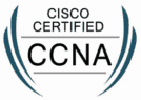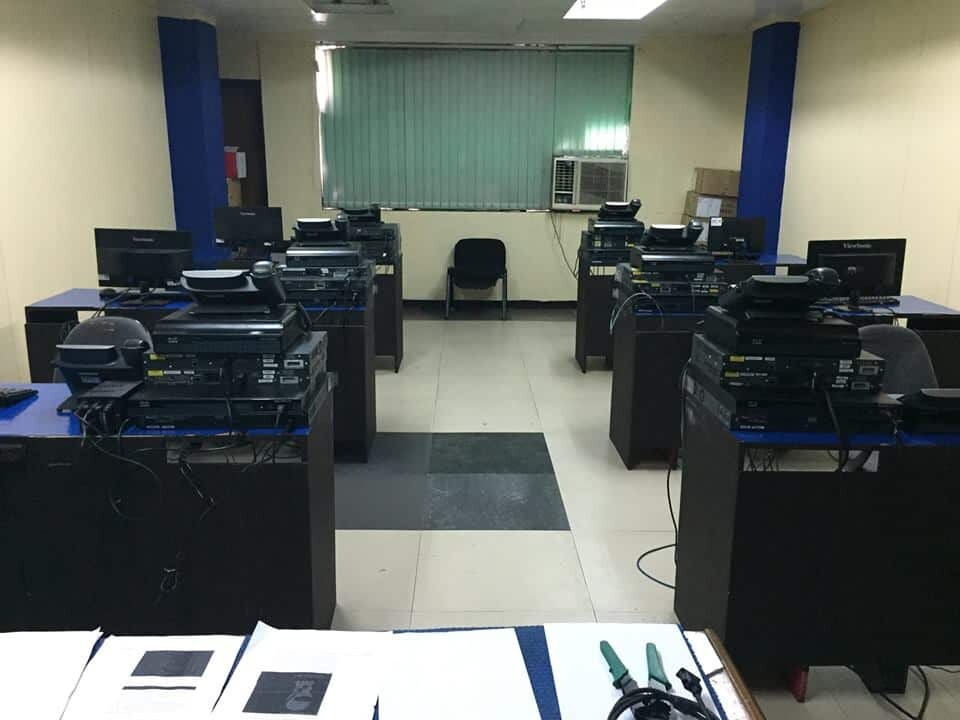CCNA1 – Routers and Routing Technology (Slow Track)

COURSE DURATION : 30 HRS
COURSE DESCRIPTION :

This module presents you with the concepts and commands you need to configure Cisco routers in multi-protocol internetworks.
During the course, you will build a Cisco network from the ground up. This experience, combined with lectures, discussions, exercises and challenging labs, will give you the hands-on experience you need to configure and maintain Cisco routers in the real world.
This training will provide students with the essential knowledge to install, configure, and operate routed LANs and WANs.
This course will prepare students pass the CCNA certification.
END OF THE ROAD: This course is no longer offered for Certification effective Feb 24, 2020 . Please check this link for the New CCNA Certification 2020
COURSE OUTCOMES :
- Design a simple LAN using Cisco Technology
- Design an IP addressing scheme to meet design requirements
- Select an appropriate routing protocol based on user requirements
- Design a simple internetwork using Cisco technology
- Configure routing protocols
- Configure IP addresses, subnet masks, and gateway addresses on routers and hosts
- Configure a router for additional administrative functionality
- Implement a LAN
- Manage system image and device configuration files
- Perform an initial configuration on a router
COURSE DELIVERY:
Instructor-led, classroom/laboratory-delivery learning model with structured hands-on and minds-on activities and laboratory activities.
ENTRY REQUIREMENTS/PRE-REQUISITES:
Students should have a working knowledge of LAN Local Area Network or have taken the following course or its equivalent:
CISCO LAB EQUIPMENTS:
- CISCO Routers: 2901, 1941, 2821, 2801 and 1841
- CISCO Switches: Catalyst 3550 Layer 3 (Multi-Layer) series, Catalyst 3750 Series Layer 3, Catalyst 3560G POE Layer 3 Switch
- Two (2) Computers per Trainee
- IP PHONES 7962G for VOIP
ROUTERS TO STUDENT RATIO:
3 Cisco Routers, 2 Catalyst Switch, 2 Computers and 2 IP PHONES for VOIP per TRAINEE. Guaranteed true HANDS-ON training We use the latest CISCO IOS and 2901, 1941, 2821, 2801 CISCO devices. This will ensure that our students will learn by doing. Total HANDS-ON CCNA Transfer of Technology. 99.99% Passing rate.
OUR INSTRUCTORS:
Our Trainers are certified CCNA, CCNP, CCIE, CCAI, JUNIPER , COMPTIA A+ N+ and Microsoft Certified. Guaranteed expert instructors with massive industry experience and having good communication and teaching skills.
COURSE INCLUSIONS:
- Free Lunch Meal
- Free Flowing Coffee
- Free Remote CCNA Lab Access
- Free CCNA Review
- Free CCNA Practice Exams
- Training Materials
- Certificate of Completion
COURSE OUTLINE
Chapter 1: Network Fundamentals
1.1 Compare and contrast OSI and TCP/IP models
1.2 Compare and contrast TCP and UDP protocols
1.3 Describe the impact of infrastructure components in an enterprise network
• Firewalls
• Access points
• Wireless controllers
1.4 Describe the effects of cloud resources on enterprise network architecture
• Traffic path to internal and external cloud services
• Virtual services
• Basic virtual network infrastructure
1.5 Compare and contrast collapsed core and three-tier architectures
1.6 Compare and contrast network topologies
• Star
• Mesh
• Hybrid
1.7 Select the appropriate cabling type based on implementation requirements
1.8 Apply troubleshooting methodologies to resolve problems
• Perform and document fault isolation
• Resolve or escalate
• Verify and monitor resolution
1.9 Configure, verify, and troubleshoot IPv4 addressing and subnetting
1.10 Compare and contrast IPv4 address types
• Unicast
• Broadcast
• Multicast
1.11 Describe the need for private IPv4 addressing
1.12 Identify the appropriate IPv6 addressing scheme to satisfy addressing requirements in a LAN/WAN environment
1.13 Configure, verify, and troubleshoot IPv6 addressing
1.14 Configure and verify IPv6 Stateless Address Auto Configuration
1.15 Compare and contrast IPv6 address types
• Global unicast
• Unique local
• Link local
• Multicast
• Modified EUI 64
• Auto configuration
• Anycast
Chapter 2: Routing Technologies
2.1 Describe the routing concepts
• Packet handling along the path through a network
• Forwarding decision based on route lookup
• Frame rewrite
2.2 Interpret the components of a routing table
• Prefix
• Network mask
• Next hop
• Routing protocol code
• Administrative distance
• Metric
• Gateway of last resort
2.3 Describe how a routing table is populated by different routing information sources
• Admin distance
2.4 Compare and contrast static routing and dynamic routing
2.5 Compare and contrast distance vector and link state routing protocols
2.6 Compare and contrast interior and exterior routing protocols
2.7 Configure, verify, and troubleshoot IPv4 and IPv6 static routing
• Default route
• Network route
• Host route
• Floating static
2.8 Configure, Verify, and Troubleshoot single area and multi-area OSPFv2 for IPv4 (excluding authentication, filtering, manual summarization, redistribution, stub, virtual-link, and LSAs)
2.9 Configure, Verify, and Troubleshoot single area and multi-area OSPFv3 for IPv6 (excluding authentication, filtering, manual summarization, redistribution, stub, virtual-link, and LSAs)
2.10 Configure, Verify, and Troubleshoot EIGRP for IPv4 (excluding authentication, filtering, manual summarization, redistribution, stub)
2.11 Configure, Verify, and Troubleshoot EIGRP for IPv6 (excluding authentication, filtering, manual summarization, redistribution, stub)
2.12 Configure, Verify, and Troubleshoot RIPv2 for IPv4 (excluding authentication, filtering, manual summarization, redistribution)
2.13 Troubleshoot basic Layer 3 end-to-end connectivity issues
2.14 Configure and Verify single-homed branch connectivity using eBGP IPv4 (limited to peering and route advertisement using Network command only)
2.15 Configure, verify, and troubleshoot basic device hardening
• Local authentication
• Secure password
• Access to device
a. Source address
b. Telnet/SSH
• Login banner
Chapter 3: Infrastructure Services
3.1 Describe DNS lookup operation
3.2 Troubleshoot client connectivity issues involving DNS
3.3 Configure and verify DHCP on a router (excluding static reservations)
• Server
• Relay
• Client
• TFTP, DNS, and gateway options
3.4 Troubleshoot client- and router-based DHCP connectivity issues
3.5 Configure, verify, and troubleshoot inside source NAT
• Static
• Pool
• PAT
3.6 Configure and verify NTP operating in a client/server mode



WHEN WILL BE OUR NEXT COURSE ON CISCO 1 AND 2?
Question, kelan po ung schedule for the new curriculum.?
Please check above scheds, those are for new CCNA Certification FEb 2020 update. New Curriculum for CCNA R&S
May i ask if there’s only weekend schedule?
I am working Mon to Fri
Hello. Yes, meron pong available weekend schedule every Saturday and every Sunday.